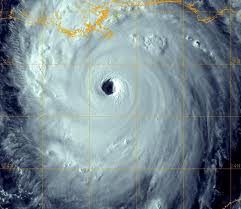 |
| Hurricane Katrina |
Now it was time to step back and view a wider picture by using the lens of sociology. To do this, we invited Dr. Bethany L. Brown, Assistant Professor in the Department of Criminal Justice at Loyola University New Orleans, to speak with us. Dr. Brown's background in both sociology and criminal justice and her research focus on crisis and disaster situations made her the perfect person to help us widen our perspective on Hurricane Katrina.
Dr. Brown explained that sociology is a scientific and systematic study of human society that helps us to see general patterns. It enables us to see personal problems in light of larger social issues. Sociology analyzes things that are often taken for granted and makes those things conscious and visible.
The sociology of disaster examines what happens when a hazardous event and people interact. Dr. Brown emphasized that a disaster does not create social problems but reveals problems that are already there.
One social problem brought into stark visibility by Hurricane Katrina is social inequality. Those with money, resources, and connections could evacuate if they chose to do so, while those without money, resources, and connections could not. No provision was made to assist those without money, resources, and connections other than the very inadequate Superdome and the utterly inadequate Convention Center. When people must rely on their own resources in a disaster, the unequal distribution of resources becomes highly visible.
Dr. Brown also called our attention to another social problem made visible by Hurricane Katrina--society's unequal treatment of people from different racial backgrounds. Dr. Brown illustrated this with two contrasting news photos. Both photos show people who retrieved food and supplies from convenience stores in New Orleans after Hurricane Katrina in order to survive. In the first photo, the people are African American (black), while in the second photo, the people are Caucasian (white). The two photos appear below, with the relevant words in each caption capitalized.
The first photo shows two African American women carrying bags through the flood.
 |
| "LOOTERS carry bags of groceries through floodwaters after TAKING the merchandise AWAY from a wind damaged convenience store in New Orleans" |
The second photo shows two Caucasian men also carrying bags through the flood.
 |
| "Two RESIDENTS wade through chest-deep water after FINDING bread and soda from a local convenience store in New Orleans" |
The African American women are described as LOOTERS who TAKE groceries AWAY. The Causasian men are described as RESIDENTS who FIND groceries. Although both the African American women and the Caucasian men were doing the same action (retrieving food and drink from a convenience store) for the same purpose (to survive), the African Americans are pictured as thieves and the Caucasians as survivors.
Dr. Brown helped us to see the larger social issues underlying the personal Hurricane Katrina stories we had read and heard. Thank you, Dr. Brown, for helping us to widen our lens and view Hurricane Katrina from a sociological perspective.
Our next post will tell you about our van tour of New Orleans sites important in the book ZEITOUN by Dave Eggers, read by LIEP students in our reading classes. We visited the sites important to Mr. Zeitoun and his family as they struggled through the difficult time after Hurricane Katrina.
No comments:
Post a Comment